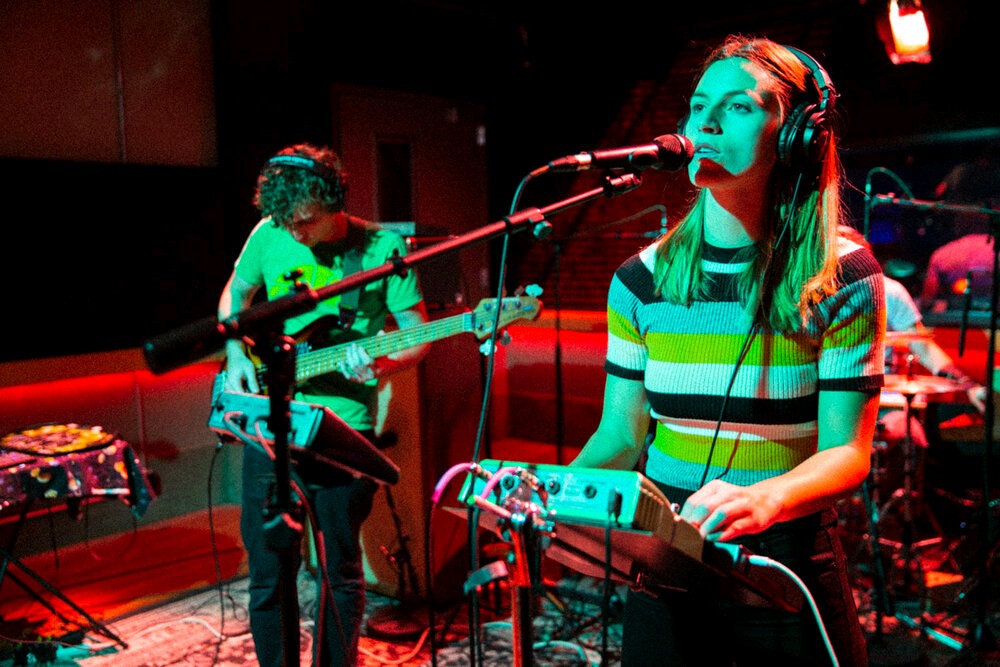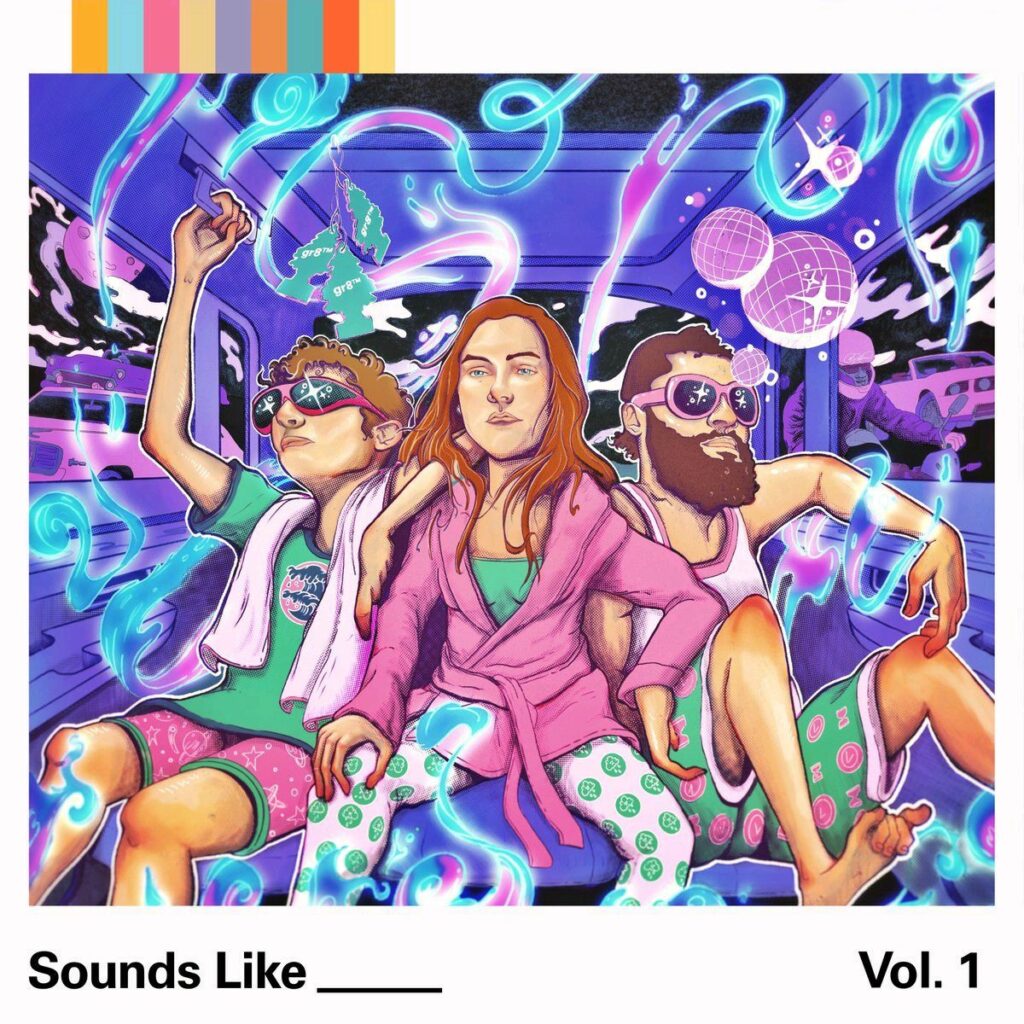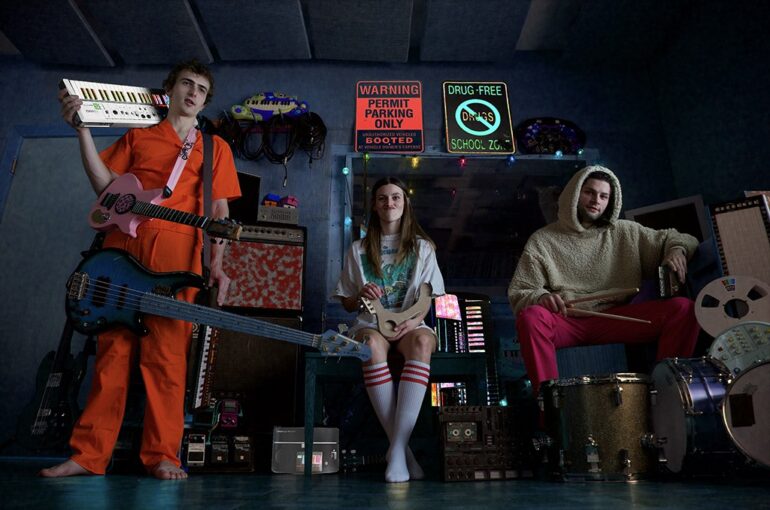There’s something wrong with the music industry as a whole. The idea that music streaming platforms can get away with their pay model is a crime in itself. Companies like Spotify tend to cater to the Taylor Swifts and The Weeknds of the music industry. At the end of the year, Spotify takes a cut from a large pool of revenue and distributes the rest based upon streams. Now, there’s nothing wrong with that. Most of the time, those pop stars are very hard at work perfecting their image. Hours upon hours working in the studio can take a mental toll on even the strongest among them. But the ones who don’t make it to Taylor Swift status are usually left to fight over the crumbs from a billion-dollar industry.
Tucked away in crate boxes or a poster plastered on a street lamp post, you can find gems like Great Time creating beautiful chaos out of a shitty situation. If someone came up to me and asked to describe Great Time’s sound, it would be impossible. This trio (lead singer Jill Ryan, drummer Donnie Spackman, and guitarist Zack Hartmann) has been making music since 2015 and continues to leave listeners wanting more. Great Time’s biggest selling point is not being defined by one genre.
The band doesn’t take but expand upon elements of soul, R&B, folk, and chill to bring them all together. From their debut album, Great Album, they have always been defined by being indecisive with their sounds. It’s quite the opposite. Not being able to label yourself signals your ability to take control of the narrative big-time music outlets tend to push on smaller artists. Great Time is independent and plans to stay that way for the foreseeable future.
Great Time sat down with True Urban Culture Magazine to talk about how recording music on a farm helps with the creative process, elements of Philadelphia’s music scene influencing their music, and how the music streaming industry plays a part in the destruction of indie artists.
Right off the bat, you guys don’t have a certain style or genre of music. If You have to describe your music, what would you consider it to be?
Jill: Oh my gosh! That’s why the title of our EP is “Sounds Like ____” right? It’s like WE don’t even know! I know that we are influenced by very different types of music. I think it’s just the crossover of what we all like and it kinda comes out in what we end up creating. I mean, we all studied jazz. funk, R&B, soul, and hip-hop, we love Indie rock.
Zack: Anything good!
Jill: Yes, anything good really!
You mentioned jazz as one of your influences. Is there anyone, in particular, that’s a major influence that stands out?
Jill: Yeah, we like John Coltrane and Bill Evans. One of my favorites is Cannonball Adderley. He’s one of my favorite saxophonist players.
Zack: I think we all appreciate the musicality and technicality of jazz as a whole really. Not really always the musical decision of it but there’s a lot you can grab from and apply to your own stuff. And add a modern touch to it.
You guys have been together since 2015 when you guys met each other at NYU, correct?
Donnie: Yes, the new school. Next to or down the block from NYU. So, I would say that was early 2012. We were a different incarnation of the band though. Yeah, I guess in 2015, it’s when it became just us three. We had a couple of other guests like a few musicians who play with us too but we’re the core since 2015.
For newcomers discovering your music for the first time, what is the one thing you hope people take away upon first listen?
Zack: When we just had Great Album (Great Time’s debut album) I hoped that anybody could find at least one song on it that they liked, you know, no matter what their favorite genre was and hopefully some listeners slightly departing from that. With this new stuff (Great Time’s new EP “Sounds Like___” released last Thursday), I hope with our continuing Sounds Like series, some people will gravitate towards it. So that’s my goal, to reach a different audience and show them music genres they haven’t thought of before.
Yes, when I first listen to the Great Album, every track has a different musical genre beneath the undertone of the song. No two songs sounded the same on the album. One minute, you’re listening to a mellow indie chill track and the next minute, you’re listening to hip hop. It’s something rare in music.
Jill: Thank You
Zack: Yeah, we don’t explicitly set out to be like, “Okay, we better check all these boxes.” As we gather our bank of songs, it just turns out to be the right track for the EP. It would be less genuine to limit ourselves to just one style. That’s where the title of the EP comes from. It’s just what we do, we’re drawn to it.
Now, you guys have a recording studio. which happens to be a farm, on the outskirts of Philadelphia.
Jill: Yeah, me and Zack both grew up on the West Coast while Donnie grew up here on this farm where all his family lived. We are surrounded by chickens, soon-to-be pigs, and corn. And right in the middle of it all, nestled in, is a little studio. We just love to have the Philly community, people from New York, and the tri-state area come and feel at home. Get away from all the noise and be comfortable to create.
I’m glad you mentioned Philadephia because the city has its own unique blend of soul and R&B. How do you incorporate that sound in your songwriting process?
Jill: Philadelphia is extremely rich with talent and we live on the outskirts so we’re lucky to have been welcomed into the Philly community and their music community. We’re very inspired and have been able to collaborate with a lot of artists from Philadelphia like The Bul Bey, who is an amazing rapper and artist, Cory Bernhard who is a killer piano player and so many others. We are constantly creating music and checking out artists with who we should collaborate. We owe a lot to the Philly music community.
 Speaking of the community, is there a particular Philly music sound you would say you are heavily influenced by?
Speaking of the community, is there a particular Philly music sound you would say you are heavily influenced by?
Donnie: There’s been definitely a lot of music that we listened to as kids that never knew came from Philadelphia. Going as far back as Hall & Oates like, “Oh, that’s Philly.” The Philly soul sound is and was something that was a huge influence on us before we knew what sound that was. Back in the day, there was just a lot of legendary stuff. There’s been only a select few studios in Philly that played a big part in the making of that sound. It’s kind of an older influence, but a Philly influence.
Jill: There’s also been a lot of jazz artists that have come through Philadelphia and their whole influence.
About your Ep, “Sounds Like ___, “what has been the groundwork or foundation for what you based your project on?
Zack: It’s similar to most of our other work. In our bank of songs that we were beginning to work on in the year prior, it ultimately came down to what we wanted to make. Maybe a single, an EP, or an album. We determined that to wait on a whole album would end up being another year or so and we haven’t been very active on social media. We decided to put out more stuff frequently and went into our bag of songs and put three tracks down into the EP.
Jill: I think lyrically for me, a lot of self-reflection and self-doubt as we continue along this journey in the music industry. There will be things that come up and have you asking yourself important questions about your goals. The music is cathartic and it’s a very beautiful way to process for me. It was nice to sit and write the words for this project.
What’s the roadmap for the rest of the “Sound Like_____” series this year?
Jill: We have a big collection of songs and a few we haven’t written yet. Whenever we’re ready to start the next campaign or release the next project, we’re going to just feel it out.
Donnie: For Vol. 2, we kinda have it set, but not sure on a tracklist yet. It’s basically by feel. These next three tracks aren’t really soul, but there are still elements of that in the upcoming project. It kinda just melts together.
Zack: Yeah, the next project will definitely be a little more guitar-focused and play around with more synths.
A lot of artists tend to draw on some of the current events happening at the time. With social issues becoming a major factor in our society, how has it impacted your songwriting while tackling more important issues within the community?
Jill: Yeah, I think all of us have used this time to be self-reflecting. In isolation and grief, all the racial injustices against Asian Americans and the African American community, we’re thinking a lot about it. We’re trying to brainstorm ways that we can, as a band, do better as white folks in the community. I think it goes beyond music about who we are as people and what we can do beyond our musical talents. How we can use our white privilege to uplift our community and city.
With Soundcloud now implementing a new direct to the artist payment method on their platform, how do you see it impacting the music streaming industry?
Zack: I know this has been proposed before. Currently, Spotify’s paid model is it takes every single paid subscriber and that’s a lump of money and distributes it equally to every single stream on the entire platform, which to me, seems like it favors larger artists because they get way more streams than the smaller artists. The big artists do deserve more money as they are bringing in more or whatever. I would be curious to see them create a system where every artist’s subscriber who pays $10 a month, that cut only goes to that artist. It would be based on who actually listens to you, not just a giant pool.
Donnie: We are beholden to the almighty algorithm and no one really knows how to tame that beast. At the end of the day, that’s what the labels want. They have all the control. The labels and the people who run the company, are in control, making the most profit.
And you guys are not signed, correct?
Jill: Yes, just us!
Donnie: We have a very small team of people that we work with, very small. Back in the day, you didn’t need a label. It’s so expensive to get into a studio and hire an engineer. Now, I think it’s important for artists to own at least their own interface. and basic production software and just learn how to grow yourself. In today’s society, you don’t need a label.
Lastly, before we wrap up, what comes to mind when you think of True Urban Culture?
Jill: Because we’re so heavily influenced by the black culture and black music, I always find myself asking myself how do I fit in or worried about taking up space. But magazines like True Urban Culture are awesome because they highlight the culture and bring attention to indie artists within the community. I’ve also learned how to navigate the music industry and use my platform to amplify black voices. Hiring black artists and black visual artists like Will Johnson did our EP artwork cover.
Zack: I think it’s knowing all cultures and influences are interconnected in this really deep web of events and history. It’s about being as open as you can to new experiences and seeing how everything connects. I wouldn’t be half the musician that I am with the influence of R&B and jazz. Overall, being aware of how important influences and culture play a part in our collective history.
 Listen to Great Time’s new EP, “Sounds Like____” here.
Listen to Great Time’s new EP, “Sounds Like____” here.


